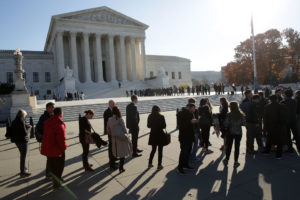
Then-candidate Donald Trump made a “Muslim ban” a campaign promise of his, and while his “travel ban” executive orders have targeted Muslim majority nations (because they have the highest terror risk), they hardly constitute a “Muslim ban.” If Trump wanted to ban Muslims from entering the U.S., he would’ve targeted the nation’s with the largest Muslim populations, like Indonesia, Saudi Arabia, or India.
Still, it was easy to blast the travel ban as a Muslim ban due to Trump’s prior rhetoric, and each executive order aiming to revise and revive the ban has been struct down by some federal judge. The state of Hawaii and the International Refugee Assistance Project challenged Trump’s latest ban, shutting it down before it could take full effect.
So, were these judges enacting their own political biases in their decisions to block Trump’s travel ban, or was it just a case of checks and balances working as intended? The travel ban has finally made its way up all the way to the Supreme Court… and as it turns out, the judges before them were indeed partisan hacks.
According to the Associated Press, “the Supreme Court is allowing the Trump administration to fully enforce a ban on travel to the United States by residents of six mostly Muslim countries.”
More: “The justices say in an order Monday that the policy can take full effect even as legal challenges against it make their way through the courts.”
Here is a more detailed description of the ban, and how the approval process happened: “The ban applies to travelers from Chad, Iran, Libya, Somalia, Syria and Yemen. Lower courts had said people from those nations with a claim of a “bona fide” relationship with someone in the United States could not be kept out of the country. Grandparents, cousins and other relatives were among those courts said could not be excluded. Justices Ruth Bader Ginsburg and Sonia Sotomayor would have left the lower court orders in place.”
Seven of the nine Supreme Court Justices agreed that the ban was constitutional for the time being, finally establishing some much needed precedent on such travel bans.
Share this breaking news with others now!
